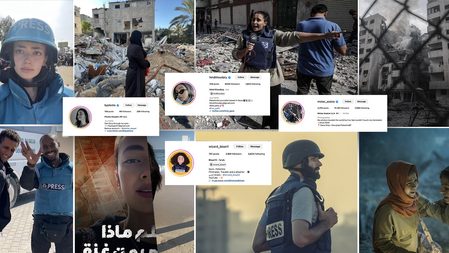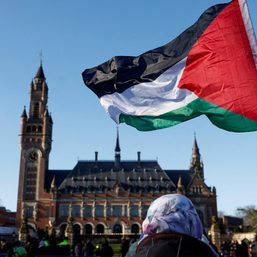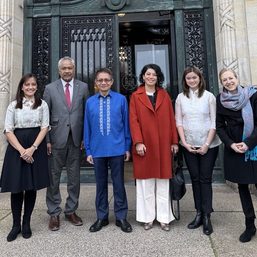MANILA, Philippines – On December 6, for the first time in United Nations (UN) history, Secretary General Antonio Guterres invoked a power to call on the UN Secretary Council to declare a ceasefire in Gaza, where more than 15,000 have been reportedly killed by Israel’s bombardment.
“Nowhere is safe in Gaza…The situation is fast deteriorating into a catastrophe with potentially irreversible implications for Palestinians as a whole and for peace and security in the region,” said Guterres, his letter reflecting the urgency, and to some extent, the desperation to stop the crisis in Gaza.
But Guterres does not, and will not, call the situation a genocide.
“It is a legal position that the Secretary-General does not have the authority to designate an event a genocide,” said his spokesperson Stéphane Dujarric in a press briefing on November 1.
Genocide is a legal concept developed more clearly after the World War II, when international law projects were also crystalized. Genocide is a systematic oppression that results in death or other physical destruction of a mass of people, with an intent to destroy in whole or in part a national, ethnic, racial or religious group.
For Gazans, what’s happening to them, including the whole 75 years of Israeli occupation, is genocide.
Getting judicial declaration that it is genocide is another thing. So far, only a few cases have been recognized as one such as the Cambodian Khmer Rouge regime, the Rwandan civil war that killed the ethnic Tutsis, and the massacre of Muslim boys in Srbrenica in Bosnia.
The two rules that have to be violated to meet the genocide standard are the rules of distinction and rules of proportionality. Rules of distinction mean you distinguish between military targets and civilians that you must spare. But if it cannot be helped that civilians will be attacked too, the rule of proportionality requires that your military gain must be proportionate to justify the civilian casualty.
Another standard introduced by the prosecutor of the International Criminal Tribunal for the former Yugoslavia (ICTY) is the “reasonable military commander.” In this test, you look at whether the military was reasonable when it was calling the shots, that it took all reasonable steps to spare civilians.
New reporting by the The Guardian says Israel uses artificial intelligence they called “The Gospel” to select bombing targets in Gaza.
Several foreign governments have already called it a genocide. Craig Mokhiber, the New York director of the UN Office of the High Commissioner on Human Rights (OHCHR), called it “text-book genocide” when he resigned from office, decrying the diplomatic failure in the war. High Commissioner on Human Rights Volker Türk said in November that “we have serious concerns that these are disproportionate attacks that could amount to war crimes.”
UN Special Rapporteurs have gone as far as warning lawyers of the Israeli military that they are accountable to potential war crimes for the advise they gave.
It’s an example of diplomats stretching the power of rhetoric, but stopping short of calling it a legal term, following the tradition of letting judicial agencies declare it as crimes.
Even before the October 7 Hamas attack that started the Israeli retaliation, there were already two pending cases that investigated whether Israel’s occupation of Palestine was illegal. One in the UN court, the International Court of Justice (ICJ), and the other at the International Criminal Court (ICC).
What’s the ICC doing?
But since the latest war, ICC Prosecutor Karim Khan said his investigation covers the latest bombing, but that his jurisdiction extends from Israel’s possible crime, to Hamas’ potential crimes.
Only Palestine is an ICC member. But under jurisdiction rules, ICC can investigate crimes by a non-member if it happens on the territory of a member (Israel’s alleged crimes in Palestine); and crimes in a non-member area if it was committed by actors of a member state (Hamas’ alleged crimes in Israel).
The Rome Statute allows third parties to submit evidence, and Khan’s Office has already put out a public call for third party submissions. There’s mounting pressure on Khan to act fast, comparing the one year it took him to request for a warrant of arrest against Russian President Vladimir Putin in the war in Ukraine.
“Let them do that, apply international law, why international law is applied to everybody but Israel,” said Mustafa Barghouti, a West Bank-based politician of the Palestinian National Initiative.
This latest war in Gaza has renewed criticism that international law as a mechanism has always been biased in favor of Western powers, especially because the formative concepts of it were invented by the Western victors of World War II.
Reporter: Lian Buan
Producers: Cara Angeline Oliver, JC Gotinga
Production specialists: Jeff Digma
Video editor/animator: Cara Angeline Oliver
Graphics: Nico Villarete, Raffy De Guzman, Marian Hukom, David Castuciano
Supervising producer: Beth Frondoso
– Rappler.com
How does this make you feel?




![[Vantage Point] The PDEA leaks](https://www.rappler.com/tachyon/2024/05/vantage-point-pdea-probe.jpg?resize=257%2C257&crop=255px%2C0px%2C720px%2C720px)
![[Edgewise] How Duterte can elude ICC arrest](https://www.rappler.com/tachyon/2024/05/thought-leaders-How-Duterte-elude-icc-arrest.jpg?resize=257%2C257&crop=272px%2C0px%2C720px%2C720px)
















